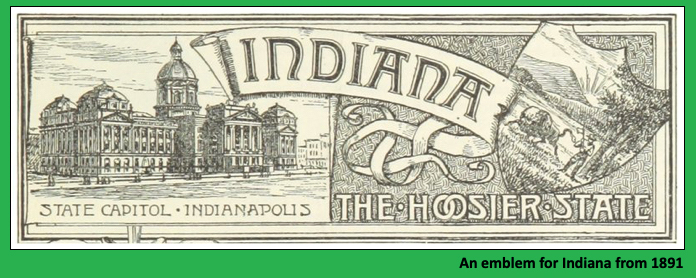|
Hoosiers

Anyone born in Indiana (or a resident) is considered to be a Hoosier.
“If you look in a dictionary, the word ‘Indianan’ may appear,” says Senator Todd Young. “But the first task, the litmus test as to whether or not someone really is from Indiana or has spent any kind of considerable time in Indiana, is whether or not they use the word ‘Indianan,’ because no one in Indiana ever uses that term. We refer to ourselves as Hoosiers.”
The term “Hoosier” was popularized by John Finley’s 1833 poem “The Hoosier’s Nest.”
“The emigrant is soon located-
In Hoosier life initiated:
Erects a cabin in the woods,
Wherein he stows his household goods.
“Erelong the cabin disappears,
A spacious mansion next he rears;
His fields seem widening by stealth,
An index of increasing wealth;
and when the hives of Hooshers swarm,
To each is given a noble farm.”
But where did the word “Hoosiers” originate?
Here’s the most common theory: When Indiana’s first settlers responded to a knock on their cabin door they would say “Who’s yere?” And from that Indiana became the “Who’s yere State” or “Hoosier State.” But that’s probably not true.
Another story tells about a contractor named Hoosier on the Louisville and Portland Canal who preferred to hire laborers from Indiana. They were called “Hoosier’s men” and eventually all Indianans were called Hoosiers. Doubtful too.
Still another explanation was put forward by historian Jacob Piatt Dunn Jr. in his 1907 book The Word Hoosier. Noting that numerous immigrants from the Cumberland region of England settled in Indiana, Dunn traced the nickname for those highland dwellers back to the word “hoozer” in the Cumbrian dialect, which derived from the Old English “hoo,” meaning “high” and “hill.”
Thus, Dunn suggests the word is equivalent to “Hillbilly.” The idea being that people from Indiana were viewed by others as hicks.
However, the fact that Indiana’s average elevation is 760 feet above sea level, and that its tallest peak is 1,257 feet above sea level, makes it seem unlikely that anyone would think of hills in Indiana.
William Pearson in the June, 1995 issue of the Indiana Magazine of History suggests that the term “Hoosier” was derived from the name of a southern, black Methodist preacher named Harry Hosier (ca. 1750 - 1806). Known as “Black Harry,” he was the first African-American religious figure to gain national prestige. Some say he was the greatest orator in America. But others challenge whether a black preacher could successfully lend his name to a state that was 90% white.
A theory attributed to Gov. Joseph Wright claimed that Hoosier was derived from an Indian word for corn, “hoosa.”
“Or they laughed at Indiana, because the people there proudly call themselves Hoosiers even though they have no idea what Hoosier means. Some historians believe it comes from the Shawnee expression ‘ho’o-sa’ars,’ or ‘people who cannot explain their nickname,’” jests Hoosier-born humorist Dave Barry in Best State Ever: A Florida Man Defends His Homeland.
The Indiana Historical Review sums it up this way:
“It seems like infinite theories exist, each more amusing than the last, all claiming to be the origin of the word Hoosier. All of them have one thing in common – they’re almost certainly apocryphal. It’s unlikely that we’ll ever know with any certainty exactly where the word ‘Hoosier’ originated. However, from the 1986 film ‘Hoosiers,’ to the Indiana University Hoosiers, to the 4,500 businesses with the word ‘Hoosier’ in their names in the state, it is safe to say that there are no Indianans in Indiana – only Hoosiers.”
|

